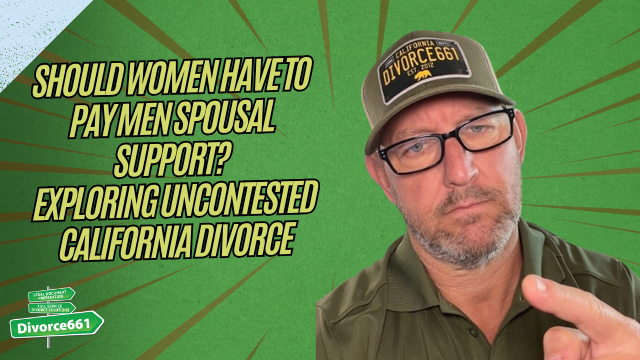🤔 Should Women Have to Pay Men Spousal Support? Exploring Uncontested California Divorce
When it comes to divorce, one of the most contentious topics often revolves around spousal support—commonly known as alimony. Traditionally, alimony is viewed as payments from a husband to a wife. But what happens when the roles are reversed? Should women have to pay men spousal support? This question raises important considerations, especially in the context of uncontested divorces in California.
Let’s dive into this topic with insights inspired by Tim Blankenship of Divorce661, who brings a fresh perspective to the discussion.
Understanding Spousal Support in California
Spousal support is designed to help a lower-earning spouse maintain a reasonable standard of living after divorce. California law does not discriminate based on gender when it comes to awarding spousal support. Instead, the court looks at factors like income disparity, length of the marriage, and the ability of each party to become self-supporting.
Gender and Alimony: Breaking Stereotypes
It’s important to challenge the stereotype that men should never receive alimony from their wives. Times have changed, and so have family dynamics. Increasingly, women have become primary earners or have greater financial resources than their spouses. In these cases, the law recognizes that men can be entitled to spousal support.
Tim Blankenship poses a thought-provoking question: “What do you think about men who accept alimony from their wife?” This invites us to reflect on societal norms and individual circumstances rather than relying on traditional assumptions.
When Might a Man Receive Spousal Support?
Several scenarios could lead to a man receiving spousal support from his wife, including:
- Income disparity: The wife earns significantly more than the husband.
- Career sacrifices: The husband may have paused or limited his career to support the family or the wife’s career.
- Health or age factors: The husband may have limited earning potential due to health or age.
- Length of marriage: Longer marriages often result in more substantial spousal support obligations regardless of gender.
Uncontested Divorce and Spousal Support Agreements
In uncontested divorces, spouses agree on terms—including spousal support—without prolonged litigation. This can make the process smoother and less stressful for both parties. When a man is set to receive support, the agreement will outline the amount, duration, and conditions clearly.
It’s crucial for both spouses to approach these negotiations with fairness and transparency. Open communication helps ensure that support arrangements are equitable and sustainable.
Changing Perspectives on Alimony
The idea of men receiving alimony challenges traditional gender roles in marriage and divorce. But it’s a reality that reflects modern relationships and economic shifts. Rather than viewing this as a stigma or an anomaly, it’s more constructive to see spousal support as a tool for fairness and financial balance.
Tim Blankenship’s question encourages us to engage in this conversation openly. What are your thoughts on men accepting alimony from their wives? Share your perspective and help broaden the dialogue around spousal support in today’s world.
Conclusion
Spousal support is not about gender—it’s about fairness. California law supports this principle by considering each spouse’s unique situation rather than defaulting to traditional roles. Whether a man or a woman receives support depends on many factors, including income, marriage length, and the ability to become self-supporting.
By understanding these nuances, couples can approach uncontested divorces with clarity and respect, ensuring that spousal support arrangements serve the best interests of both parties. Reflecting on this topic with an open mind helps us move beyond stereotypes and towards a more equitable approach to divorce.

